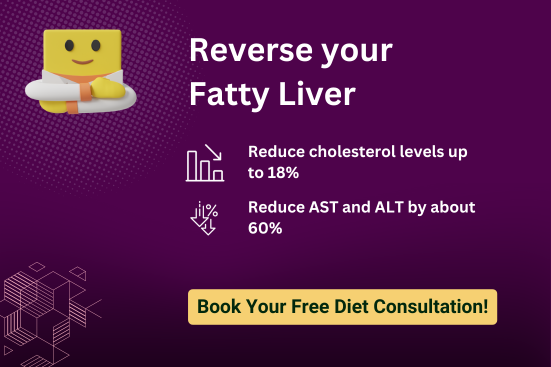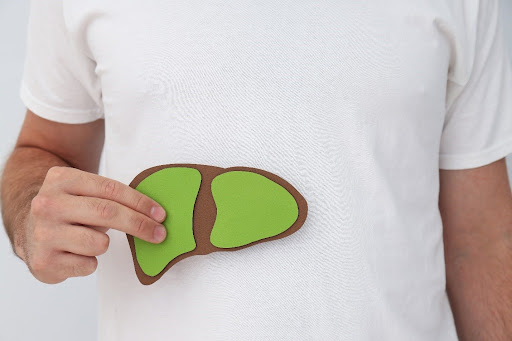A Dietary Guide to Gifting Your Fatty Liver a Long Life

Guarding Your Liver: Practical Tactics to Lower Fatty Liver Risk
24 Apr 2024
Fatty liver or hepatic steatosis, as the term suggests, refers to the accumulation of excess fat in your liver. This condition is not just about excess weight or obesity; it’s a silent health crisis. It is alarming because it often gives you no hint of its presence until it has already caused serious damage.
The liver is a vital organ responsible for various functions, including detoxification of the body and protein synthesis. A fatty liver can result in compromised liver function and, in severe cases, can lead to cirrhosis — a life-threatening condition characterised by severe scarring of the liver.
The risk of fatty liver increases when we don’t pay heed to the harmony between our lifestyle and health. But, there’s good news! With the right knowledge and actions, we can positively influence this risk. Understanding the causes of fatty liver and identifying the associated risk factors are key to our battle against this health condition. In this blog, we will discuss practical strategies to reduce your fatty liver risk. With these handy tips and strategies, you’ll be better equipped to prevent this condition and live a healthier life. Whether you are at risk or simply want to fortify your knowledge for future preventative measures, these valuable insights can make a significant difference in your life.
The Carbohydrate Conundrum: A Matter of Balance
While carbohydrates are essential for our body, too much of them can be a problem. Consuming foods rich in unhealthy carbs can spike blood sugar levels, leading to insulin resistance which is a key fatty liver risk factor.
The trick lies in balance. Opt for complex carbs like whole grains, fruits and vegetables rather than sugar-laden processed foods. These not only keep your blood sugar levels stable but also provide essential vitamins and fibres. Remember, moderation is key; overeating even healthy carbs can contribute to weight gain and liver issues.
Exercise: Your Liver’s Best Friend
Regular exercise is a boon for your liver health. A consistent workout routine helps control weight and reduce abdominal fat – both significant risk factors for hepatic steatosis.
But don’t worry about sweltering hours in the gym; even moderate activities like brisk walking, cycling or dancing can make a substantial difference in reducing the risk of fatty liver as well as maintaining overall well-being. The goal is to be active, in a way that suits you best. Every step counts towards a healthier liver.
Liquid Traps: The Alcoholic and Sugary Pitfalls
Excessive alcohol consumption is a well-known cause of fatty liver. However, what many people don’t realise is that sugary drinks, including fruit juices and fizzy drinks, can be just as harmful. They add empty calories to your diet and contribute to weight gain and liver damage.
Limiting alcohol and replacing sugary drinks with water, herbal tea or unsweetened beverages can significantly reduce the risk of fatty liver. Hydration is key; it helps your liver function optimally and flush out toxins more effectively.
A quick tip: Your lifestyle and fatty liver risk go hand in hand. Improving your lifestyle by making small changes such as opting for green tea instead of tea with sugar can make a significant impact on your liver health
Gut Health: Your Liver’s Unlikely Ally

Emerging research suggests that the health of our gut, also known as our gut microbiome, is linked to fatty liver disease. A healthy gut microflora aids digestion, reduces inflammation and reduces the risk of fatty liver.
To support your gut health, including probiotic-rich foods like yoghurt, fermented foods and fibre-rich fruits and vegetables in your diet.
Recipe: Buttermilk or chaas is an excellent drink to improve your gut health. Here is a quick and simple recipe. Ingredients: 1 cup plain yoghurt, 1 cup cold water, salt to taste (optional), a pinch of roasted cumin powder (optional), chopped fresh coriander leaves for garnish (optional). Method: In a bowl, whisk the yoghurt until smooth. Gradually add cold water while whisking until well blended. Add salt to taste and mix well. Optionally, sprinkle a pinch of roasted cumin powder for extra flavour. Garnish with chopped fresh coriander leaves. Serve chilled and enjoy the refreshing taste of homemade buttermilk.
Sleep: The Silent Guardian
The importance of a good night’s sleep for overall health is undisputed. However, its role in preventing fatty liver may surprise you. Poor sleep patterns can disrupt metabolic processes, leading to weight gain and increased fatty liver risk.
Aim for 7-9 hours of sleep every night. If this seems like a tall order, start by establishing a consistent bedtime routine. Good sleep not only benefits your liver but enhances your overall well-being too.
Preventing fatty liver disease doesn’t require drastic measures. With these simple lifestyle changes, you can significantly reduce your risk and pave the way for a healthier life.
In conclusion, it is quite clear that this health condition isn’t just about what you eat. Lifestyle and fatty liver risk are two sides of the same coin. From identifying the causes of fatty liver to understanding risk factors for hepatic steatosis, it all comes down to a holistic approach towards health and well-being. Remember, prevention is always better than cure, particularly when it comes to matters of your health.
At TatvaCare, we are here to guide you on this path towards better health. Our tailored health solutions and personalised care are designed to support you at every step of the way. Get in touch with us today because when it comes to your health, every moment counts.

FAQs
Q. Is eating a healthy diet helpful in preventing fatty liver?
A: Absolutely, having a balanced diet plays a crucial role in reducing the risk of developing fatty liver. Opt for plant-based foods, lean proteins, whole grains and healthy fats. Limit processed foods, sugar and saturated fats to maintain a healthy liver.
Q. Can regular exercise reduce the risk of fatty liver?
A: Yes, regular exercise is an effective strategy to prevent fatty liver. Aerobic activities such as walking, cycling and swimming help burn triglycerides and can reduce liver fat.
Q. Does being overweight contribute to fatty liver?
A: Certainly, being overweight increases your chance of developing fatty liver. Losing weight can significantly help in preventing this condition. It’s worth noting that rapid weight loss can also lead to fatty liver. So, aim for a slow, stable weight reduction.
Q. Is moderate alcohol consumption safe in terms of fatty liver?
A: While moderate alcohol consumption may not directly lead to fatty liver, it can exacerbate an existing condition. Chronic and heavy drinking is a significant risk factor for hepatic steatosis and should be avoided.
Q. Can diabetes increase the risk of fatty liver?
A: Unfortunately, yes. Diabetes, particularly type 2 diabetes, can increase the risk of fatty liver disease. This is due to insulin resistance which increases fat accumulation in the liver. Therefore, managing diabetes effectively is essential in reducing this risk.

Medically reviewed by
Dr. Krunal Chaudhari 
MBBS, MD
Recent Blog
- CDSS – Revolutionising Diagnosis with AI-Powered Clinical Decision Support System
- Handwritten to Digital in Seconds: SmartSync Converts Prescriptions Instantly
- Voice Rx by TatvaPractice: A Smarter Way to Digitise Prescriptions
- PCOS Facts vs. Myths: Get the Right Information
- The PCOS-Insulin Resistance Connection: Unlocking Solutions for Better Health
Archives
Categories
- Asthma (20)
- Diabetes (15)
- Fatty Liver (20)
- High Blood Pressure (2)
- High cholesterol (2)
- Hypertension (2)
- Insulin Resistance (1)
- Obesity (8)
- PCOS (6)
- TatvaPractice (11)
Let’s Connect
Quick contact




